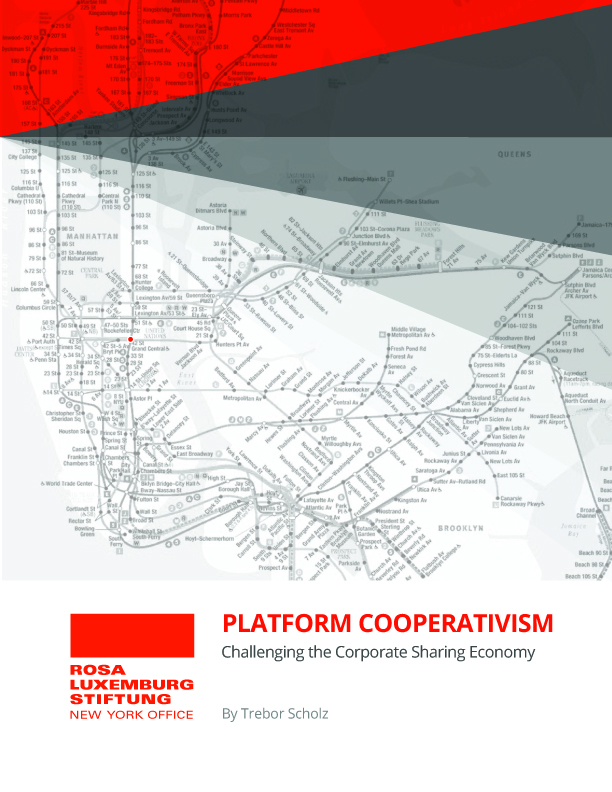Challenging the Corporate Sharing Economy
Among all the problems with 21st-century work — the ballooning of the low wage service sector, economic inequality, the crumbling of worker rights — the main problem really is that there are so few realistic alternatives. What has been missing from the debate about the future of work is an approach that offers people something that they can wholeheartedly embrace. This is what this study is about.
First, I will reflect on the opportunities, pitfalls, and consequences of the sharing economy. I am using the case of Amazon.com, which has firmly entered the “sharing economy.” Second, I will describe the rise of platform cooperativism and offer examples of really existing as well as imaginary platform co-ops. What I call platform cooperativism is about democratic ownership models for the Internet. Third, I’ll outline ten principles for labor platforms that are bringing fairness to work on labor platforms. I will conclude with reflections about possible next steps for this movement in the making.
The Consequences of the Sharing Economy. They called it the gig economy, the peer economy, the sharing economy. It took a while to acknowledge that the sharing economy was really an on-demand service economy that set out to monetize services that were previously private. It is true that there are undeniable opportunities for students, educated workers between jobs, and everyone who owns a second home. Now, it’s easier for college graduates to land a gig assembling furniture or renovating someone’s house. Consumers, raised with a keen appreciation of low prices and uber-convenience above all else, welcome these upstarts. But should we understand the sharing economy as a road sign pointing to a better, more flexible future of work? What has this economy really brought us?
Welcome to the Potemkin Villages of the “sharing economy” where you can finally sell the fruit from the trees in your garden to your neighbors, share a car ride, rent a tree house in Redwood Forest, or visit a Kinkbnb. Your friendly convenience is, for many workers, a low-wage, precarious trap. But you, on the other hand, can listen to your very own Spotify account in an Uber taxi. No longer do you have to suffer from what economist George Akerlof penned “market for lemons;” these new platforms are introducing new checks and balances. You are promoted to middle management, entitled to fire your driver. Companies even found a way to suck financial value out of your interactions with everyday objects, recruiting them as informants for surveillance capitalism.
Oh-so-cool labor companies like Handy, Postmates, and Uber celebrate their Andy Warhol moment, their 15 billion dollars of fame. They revel in the fact that they launched their platform monopolies in the absence of a physical infrastructure of their own. Just like AOL and AT&T didn’t build the Internet, and Mitt Romney did not build his business all by himself, the firms in the on-demand economy did not build their empires either. They are running off your car, your apartment, your labor, your emotions, and importantly, your time. They are logistics companies that require participants to pay up to the middleman. We are turned into assets; this is the financialization of the everyday 3.0.
In What’s Yours is Mine, the Canadian researcher Tom Slee sums it up:
Many well-intentioned people suffer from a misplaced faith in the intrinsic abilities of the Internet to promote egalitarian community and trust, and so have unwittingly aided and abetted this accumulation of private fortune, and the construction of new and exploitative forms of employment.
At the Platform Cooperativism conference John Duda of the Democracy Collaborative stated that:
The ownership of the institutions that we depend on to live, to eat, to work is increasingly concentrated. Without democratizing our economy we will just not have the kind of society that we want to have, or that we claim to have, we are just not going to be a democracy. The Internet is certainly not helping! It is fueled by short-term thinking, corporate profits; it is directed by venture capital and it’s contributing to the concentration of wealth in fewer and fewer hands. Wherever the tech economy is rampant, housing becomes totally unaffordable. We need to reverse that trend.
Occupations that cannot be offshored — the pet walker or home cleaner — are becoming subsumed under what Sasha Lobo and Martin Kenney call platform capitalism. Baby boomers are losing sectors of the economy like transportation, food, and various other sectors, to millennials who fiercely rush to control demand, supply, and profit by adding a thick icing of business onto apps–based user interactions. They are extending the deregulated free market into previously private areas of our lives.


Importantly, we cannot have this discussion without first acknowledging that the “sharing economy” is not some sort of isolated shrinkwrapped cube in “cyber space,” it’s just another reflection on capitalism and the massive atlas of digital labor practices. Consequently, we cannot have a conversation about labor platforms without first acknowledging that they depend on exploited human lives all along their global supply chains, starting with the hardware without which this entire “weightless” economy would sink to the bottom of the ocean.
All the beloved Apple devices cannot be considered without first reminding ourselves of the labor conditions at what Andrew Ross called the “Foxconn’s suicide mills” in Shenzhen, China. Or take the rare earth minerals in the Democratic Republic of the Congo; it is essential to follow the supply chains that facilitate all those outwardly clean and glamorous digital life styles.
There is a mass of bodies without a name, hidden behind the screen, exposed to workplace surveillance, crowd fleecing, wage theft, and proprietary software. As the free software activist Micky Metts cautioned: “When building platforms, you cannot build freedom on someone else’s slavery.”
When responding to a political critique of the on-demand economy, some scholars pose that, well, the terrible results of unfettered capitalism are well understood; that whole spiel does need to be asserted yet another time. But perhaps, as McKenzie Wark claimed: “This is not capitalism, this is something worse.” He suggested that “the mode of production we appear to be entering is one that is not quite capitalism as classically described.”
Download the whole publication here




